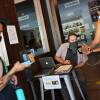On Monday, Boston Mayor Michelle Wu announced a new requirement that individuals entering many indoor spaces provide proof of vaccination , starting Jan. 15. She said Wednesday that in the days since that announcement, she's been bombarded by racist and xenophobic abuse on social media and through other channels.
"This is not new, in my political career, but it has been quite intense over the last couple days," Wu told GBH News. "Because there's been, it seems like, a national descent of hate ... across various social media channels and flooding into the city's 311 call center.
"It disrupts how I like to be connected to constituents, because I do personally check and respond to my messages on social media," added Wu, who also announced a new vaccination requirement for city workers this week. "Following what our residents are talking about and thinking is really important to me — to be directly connected and invested that way. [But] over the last couple days ... there's been too much hate, hateful rhetoric, coming from, it seems like, all across the country to properly sift through what is actually coming from Boston residents."
Slurs and threats can also be found in abusive comments left on the Facebook page belonging to Geoff Diehl, the current favorite to win the Republican nomination in the 2022 governor’s race. Diehl, who lives in Whitman, opposes the new policies, and joined protesters at Boston City Hall Monday.
"Communist Wu needs to go back to China. ... You want civil war, you'll get one," one commenter said in response to a post from Diehl about his opposition to Boston's new requirements.
"Another oriental in a government position,” said another. “[I]s it me or are there way more oriental people within all facets and levels of influence ... Has China already taken over or are they getting situated to take control of everything[?]"
As of midday Thursday, Diehl had not responded to that or similar comments, and Diehl campaign manager Amanda Orlando said he is not obligated to.
"Geoff's comments, and those of official members of his campaign team, regarding Mayor Wu and her recent public statements and mandates are the only ones which should be ascribed to him," Orlando said in an email. "The standard that a politician should denounce public commentary on social media by people not connected to his campaign is not a standard that you, or most in the media, would apply to any other politician, and, as such, we are expecting that it not be applied to the Diehl campaign either."
Sift through the replies to Wu's mayoral Twitter account , and you'll find comments accusing her of working for the Chinese Communist Party or referring to her as "Mayor Wuhan" or "Michelle Wuhan" — a reference both to the Chinese province where COVID-19 seems to have originated, and to frequent attempts on the political right to describe the pandemic as fundamentally Chinese.
Wu, who's urged Boston residents to approach her as she takes the "T" to work, said she hasn't yet experienced any comparable pushback as she traverses the city. But she sees a connection between Monday’s protest against the new requirements and the vitriol that's followed online.
"I've grown up my whole life knowing what it feels like to feel invisible or othered, and this is an experience that far too many Americans share," Wu said. "Standing at the at the podium, hearing the demonstrators who were opposing our policies singing patriotic songs and chanting 'USA' — the message was clear that we don't belong here in their eyes, and shouldn't be trying to take away something that they perceive they have and are losing.
"It's a very sad situation,” she added. “Because we've gotten so far from the American values that brought my family and so many families here, amidst tremendous sacrifice, to be part of this special place.”
In an appearance Wednesday on GBH’s Boston Public Radio, Wu elaborated on her experience this week and situated it in a broader context.
"Every time I open my phone it's another dozen hateful messages ... from folks outside the city and all across the country who feel enraged at Boston taking a leadership role here," she said.
“Unfortunately, it’s nothing that I am experiencing by myself,” Wu added. “A lot of women of color, a lot of people of color in leadership positions, Asian Americans in this moment through the pandemic — I mean, this is a very familiar experience, unfortunately."
Earlier this year, Diehl and the Massachusetts Republican Party supported Donnie Palmer, a Boston City Council candidate who claimed , erroneously, that Wu’s election would put a Chinese citizen in control of the city.








